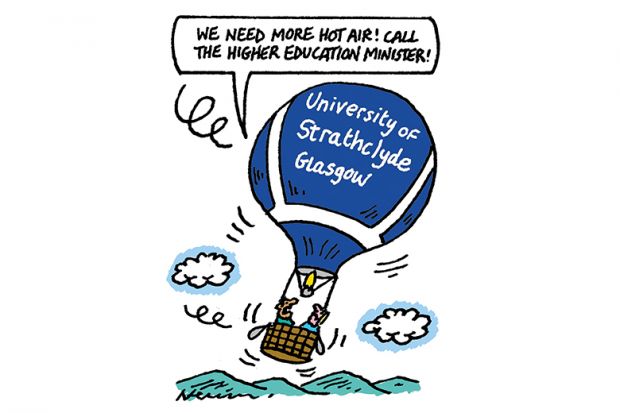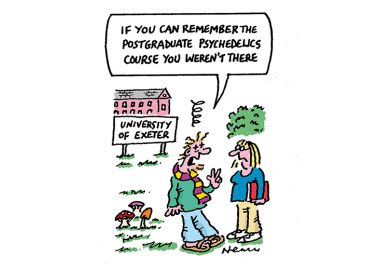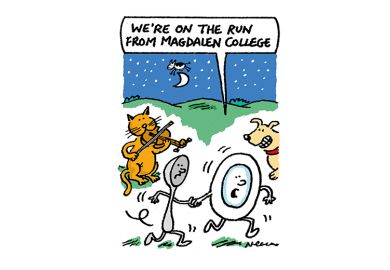
A powerful marketing campaign catches a wider wave of feeling and, as 2023 opened with an overblown international incident about Chinese surveillance balloons, perhaps it is no surprise that smart heads at the University of Strathclyde have also opted to embrace the inspirational power of hot air. Two university-branded balloons, named Big Andy and Wee Andy – the former after Strathclyde’s founder, John Anderson, and the latter (presumably) because it is a smaller version of the other balloon – took to the skies in April. Proudly presented as a way to get students interested in science, “Scotland’s first university-branded hot-air balloon” took a trip over Loch Lomond, although Strathclyde hopes to take Big Andy to balloon festivals as far afield as Cappadocia in Turkey and Albuquerque, New Mexico. “We are also absolutely committed to widening access and can’t wait to see the project take off!” said Claudia Cavalluzzo, executive director of Converge Challenge, a programme supporting Scottish spin-outs.
Employability can be a touchy subject, particularly after millions have embraced the benefits of mass higher education. Except, that is, in China, where sulky, unemployed graduates have been told by the state to simply suck it up and find manual jobs. In March the Communist Youth League admonished those clinging to professional aspirations, the Financial Times reported. And, trying to strike a more upbeat tone, China Central Television has been broadcasting profiles of graduates who run food stalls, including one couple whom it claims rake in more than a grand a night flogging teppanyaki tofu and French fries in wealthy Zhejiang province. Many parents who paid for their children’s study by doing similar work might have thought they would win themselves tastier prospects, but a saturated labour market has seemingly left both generations having to lower their horizons.
Medical exams are notoriously difficult in many parts of the world, meaning first-year students at the University of Queensland might have been pleased when they heard that the topic for one of their coursework assignments was not related to knowledge of the human body. Instead, they were asked to in a two-part task to write about their “white privilege” and racism in their field of medicine. Sample questions included asking what cultural missteps the young doctors-in-training were worried about making in interactions with Aboriginal and Torres Strait Islander people. However, according to the Daily Mail, most students who took the assessment failed it and those who passed did so by “pretending to be racist”. Several students feared they might be expelled as a result, affecting their hopes of getting the jobs they wanted post-graduation. The university was forced to apologise and remove the results from the students’ overall grades, but said it remained committed to learning and teaching about Indigenous health.
“I practically lived in the library during exam season,” is a popular refrain heard at university campuses the world over. In California some young people have taken that quite literally. After the University of California, Berkeley announced it would close its 67-year-old anthropology library, a group of social sciences students decided to stage an open-ended sit-in, The New York Times reported. At the time of writing the group were well into their second week of occupation, having set up makeshift beds among the shelves, playing board games and eating breakfasts of croissants and granola – and all the while studying for finals. University leaders insist that closing the anthropology library, along with those of mathematics and physics, will save about $1.5 million (£1.1 million) as it faces an $82 million budget deficit. Jesús Gutiérrez, a 29-year-old PhD student who has served as de facto librarian for over a year, told a local broadcaster the group was “fighting for public resources for all”.
While concerns abound about free speech being curtailed on campuses, one Hollywood heavyweight clearly still believes that universities are places where you can be set free. Emma Watson has stepped back from acting recently after feeling “caged” and has instead decided to enrol at the University of Oxford on a creative writing course, she told the Financial Times. The Brown University graduate shot to fame with the Harry Potter franchise and appeared more recently in yet another adaptation of Little Women. She told the paper that appearing in films left her feeling that she didn’t “have a voice”. “It was very difficult to have to be the face and the spokesperson for things where I didn’t get to be involved in the process,” she added. Hopefully, becoming a postgraduate will help the UN goodwill ambassador find herself again. Perhaps best not to mention J.K. Rowling, however.
Register to continue
Why register?
- Registration is free and only takes a moment
- Once registered, you can read 3 articles a month
- Sign up for our newsletter
Subscribe
Or subscribe for unlimited access to:
- Unlimited access to news, views, insights & reviews
- Digital editions
- Digital access to THE’s university and college rankings analysis
Already registered or a current subscriber?



